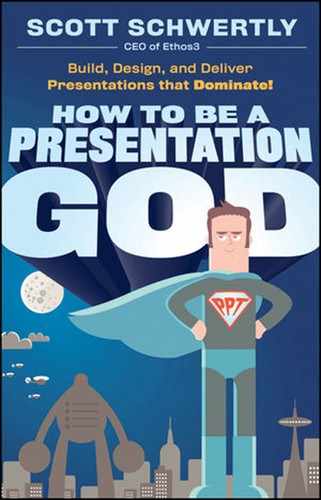Chapter 5. Don't Ruin Their Day!
Amid the countless variables that occupy your thoughts in the weeks leading up to a presentation—hairstyles, clothing, what to eat for breakfast, the subject matter—you can be certain of two things. And no, they're not death and taxes. Cryogenics and modern medicine have advanced to the point that humankind can at least begin to delude itself with the notion of immortality, even if it is at the expense of a freezer-burned nose and, if you're still paying taxes, maybe it's time to start sending Uncle Sam postcards from the Caribbean.
No, the certainties in the presentation world are simple: (1) your presentation is vital to the advancement of your career, your business, and/or humanity; and (2) your audience would rather you show up with an inflatable ball pit than a projector and laser pointer. Your human audience is like a car with golf cart tires on one side and monster truck tires on the other: It's going to take a significant steering effort to keep it on the road.
These two realities arm the presenter with a unique capability: to completely ruin hundreds, even thousands of days, all at once. An audience arrives for a presentation with a certain amount of knowledge; if you spend an hour repeating that knowledge to them, you've effectively wasted their time. They come to you with a desire to learn something; give them unorganized and indecipherable information and you've ruined their day. They show up at the expense of other items on to-do lists that sprawl beyond the confines of their cubicles; fill your presentation with unrelated stories and jokes and you're sure to watch as they foam at the mouth, chain the dais to the nearest unattended vehicle, ignite said dais, and drive around the venue seven times until the rubble closely resembles your newly amended reputation.
While not every gathering of people is a guaranteed riot, the presenter should always approach content as though rioting is a possible outcome. This doesn't mean you need to start scouring Craigslist for Kevlar vests; rather, give thoughtful consideration to how you spend your audience's time. While presentations are responsible for the most significant movements in human history—they're given before deciding battles; they ignite reforms and revolutions; they bring the ShamWow to a desperate public—we find very few individuals counting the days to the next one. Maybe just myself, even.
What your mother told you all those years ago is still true: If you want to be respected, you have to give respect. Your number one job as a presenter is to respect the audience by preparing a clear, concise, informative, and efficient presentation. Remember: You have seven seconds from the time you take the stage before they begin making sweeping judgments about you. Without solid preparation and a clearly outlined game plan, it is inconceivable that you will convey respect in those seven seconds. And disrespect is a very hard first impression to overcome.

For those with phobias of agitated crowds, riot gear improvised from office equipment, or bodily harm, there are a few easy-to-implement steps that you can take to make their time worthwhile. Following a standard protocol in the weeks leading up to your presentation will help you ensure that you are always on the side of the revolutionaries and never against them. By clarifying your objective(s), brainstorming and developing a theme, and thoroughly outlining your content, you can avoid ruining days and, instead, start getting things done.
